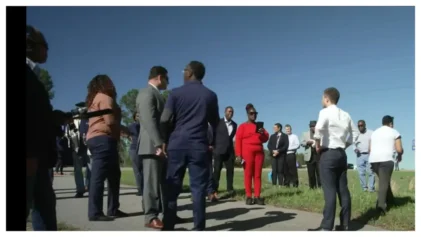Africans staying in and around India’s commercial capital, Mumbai (formerly Bombay), complain of indiscriminate racism and constant police harassment, reports the BBC’s Zubair Ahmed.
Nigerian Sambo Davis is married to an Indian woman and lives in Mumbai.
All his documents are valid, but he was arrested by the police recently on suspicion of being a drug dealer.
He and 30 other black Africans were detained for hours before they were released with an apology.
But the following day, Davis said that he was shocked to read in local newspapers that they were “arrested for drug peddling.”
“The police treat us Africans like dogs,” he says.
Davis claims he often faces discrimination when he goes to restaurants or when he tries to rent an apartment in gated middle-class communities.
But he is nevertheless one of the lucky ones. He found a decent flat to rent, thanks to his Indian wife.
But his fellow countrymen, he says, still face discrimination: “When they go to rent flats in a normal building they are told – ‘You are a black man, you are Nigerian and you are not wanted’. This is racism.”
There is no official data on how many Africans live in Mumbai, but since India’s economic progress gathered momentum in recent years, many have come to work in and around the city. Unofficial estimates put their numbers at more than 5,000.
Most of them are engaged in exporting garments to Nigeria and other African countries.
Many others are students, enrolled in the region’s prestigious educational institutions.
But there are also hundreds of Africans, mostly Nigerians, who live as illegal immigrants in India. They have either “lost” their passports or their visas have expired.
Every day, the illegal immigrants play hide-and-seek with police – if they are caught, they are sent to jail.
Ikeorah Junior from Lagos runs a cafe for Africans in a crowded market on Mumbai’s Mohammed Ali Road.
“I don’t understand why they [police] have to go from house to house to arrest the people who don’t have their papers. If they don’t have papers, then deport them, don’t put them in jail,” he says.
Ahmed Javed, who is in charge of maintaining law and order in the state of Maharashtra, says it is not that simple: “In most cases they have no passports. So, unless their nationalities are determined, they cannot be deported.”
Read more: BBC


